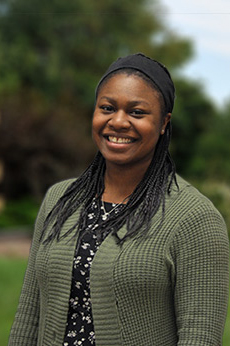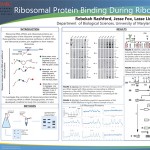Biological Sciences
“Ribosomal Protein Binding during Ribosomal RNA Maturation”

Genetic and biochemical studies of the ribosome show that ribosome formation is a complex process of synthesis and assembly of individual components, namely ribosomal proteins (rp) and ribosomal RNA (rRNA). However, the exact timing of individual rp addition to ribosome assembly RNA intermediates is not fully understood. This project was designed to develop a method for determining these binding patterns without interrupting ribosome biogenesis. Synthesis of individual tagged rp’s were induced and co-immunoprecipitated, along with the specific rRNA segment to which the rp binds. RNA was extracted from the immune precipitate and loaded on slot blots. The blots were then probed with segment-specific oligo-probes loosely corresponding to rRNA cleavage sites (a process we termed “slot-northern”). When a signal showed the slot-northern indicating a probe had bound to the rp/RNA complex, it was viewed against the known specific probe-segments of the binding probe and used to deduce the location of binding for that individual rp onto the maturing rRNA. By gaining this information about ribosomal proteins, we may better understand the ribosome in its entirety and add to the foundational understanding of one of the most important complexes in life.

Who is your mentor for your research project?
Dr. Lasse Lindahl
How did you arrange to work with this person?
One of my scholars programs helps students arrange for rotations in UMBC faculty labs. After rotating in Dr. Lindahl’s lab, we both agreed it would be a good fit for me to join.
How did you know this was the project you wanted to do?
After learning more about the possible premise of a project from Dr. Lindahl and also the graduate student I am working with, Jesse, I was curious to learn more and took up the undertaking of the project.
Is this your first independent research project?
Yes
Do you get course credit for this work?
Yes, through BIOL499.
How much time do you put into it?
Roughly 10-25 hours per week.
How did you hear about the Undergraduate Research Award (URA) program?
From Dr. Lindahl, as well as my scholars program.
What academic background did you have before you applied for the URA?
Some upper level biology courses, as well as chemistry courses. And a little bit of prior lab work.
Was the application difficult to do?
Yes, it was difficult in the sense that it forced me to thoroughly think this whole process through, but it was good for me, and it helped me understand the overall project better.
How much did your mentor help you with the application?
Dr. Lindahl was extremely helpful during the application process and helped walk me through the important experimental steps I need to take to complete this project successfully in a timely manner.
What has been the hardest part about your research?
The hardest part is understanding the underlying science behind the project. It can become so easy just going through the steps instead of making sure I understand what each step means for my overall project. Also, another difficult aspect is making sure that I keep up with writing down my work, and not let repetitive experiments go undocumented.
What was the most unexpected aspect of research?
The amount times I sometimes have to repeat the same experiment because I do not get any data from the first trial.
How does your research relate to your work in other classes?
I have been able to apply so many concepts from my Cell Biology class in the laboratory. I now understand so much about the importance of the experimental steps I am taking, and how they all fit into the bigger picture. The most helpful part was learning the different techniques that can be used in the laboratory.
What else are you involved in on campus?
I am planning on tutoring Cell Biology this Fall 2016 semester, however I have been a Learning Assistant for general chemistry courses.
What is your advice to other students about getting involved in research?
It is an excellent opportunity to find out if research is right for you and you can see yourself doing it long-term. Also, it is an amazing way (might I say, one of the best ways) to closely study what’s around us and in us, and gain a better understanding of how the world works.
What are your career goals?
To obtain my PhD or MD/PhD in a field of biological sciences.
8/3/2016